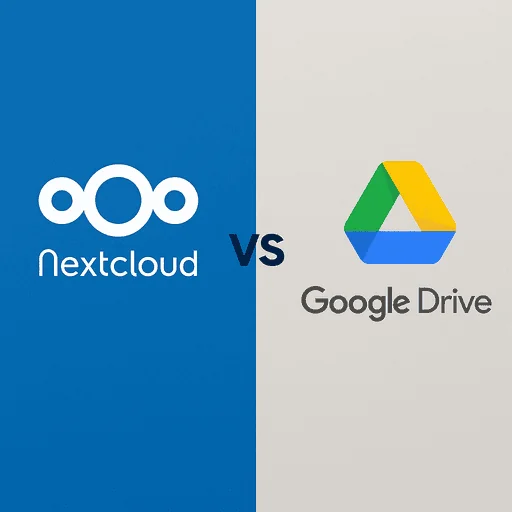Introduction
Choosing a cloud platform in 2025 means balancing convenience, privacy, and functionality. In this comparison, we explore Nextcloud, a self-hosted, open-source solution, versus Google Drive (Workspace), Google’s proprietary cloud ecosystem.
Selfhosters value control and data ownership. Privacy-conscious users want options beyond Big Tech platforms. At the same time, newcomers seek simplicity and collaboration tools. This article compares both platforms across core aspects, providing real insight for beginners and advanced users.
1. Platform Overview
Nextcloud
- Type: Self-hosted
- License: Open Source (GPLv3)
- Hosting: Your own server, VPS, or managed provider
- Audience: Privacy advocates, developers, teams wanting control
Google Drive (Workspace)
- Type: Proprietary cloud platform
- License: Closed source
- Hosting: Google’s infrastructure
- Audience: Mainstream users, teams, businesses
2. Data Privacy & Security
Nextcloud
- Control: Full control over data and location
- Encryption: Optional end-to-end encryption
- Data Access: Only accessible to owner/admin
- Compliance: GDPR-friendly; no third-party tracking
Google Drive
- Control: Google manages storage and keys
- Encryption: Data encrypted at rest and in transit
- Data Access: Accessible to Google (under policy/compliance)
- Compliance: Strong security; weaker on privacy
Tip for beginners: With Nextcloud, your data stays on your server. No one else reads your files. For teams with sensitive content, this is a strong advantage.
Advanced note: Nextcloud supports 2FA, LDAP/SAML auth, and ACLs. Privacy-centric setups may use offline key storage and additional hardening.
3. Features & App Ecosystem
| Feature | Nextcloud | Google Drive / Workspace |
|---|---|---|
| File Sync & Share | Yes, full control | Yes, tightly integrated |
| Office Editing | Yes (OnlyOffice, Collabora) | Yes (Docs, Sheets, Slides) |
| Chat / Video Calls | Yes (Nextcloud Talk) | Yes (Google Meet/Chat) |
| App Store | Yes, hundreds of extensions | No app store, but integrates with G-Suite tools |
| Calendar & Contacts | Yes (CalDAV/CardDAV) | Yes (Gmail/Calendar native) |
| Mobile/Desktop Clients | Yes, all platforms | Yes, all platforms |
4. Collaboration & Usability
Google Drive
- Strengths: Real-time collaboration, familiar UI, minimal setup
- Weaknesses: Requires Google account, no self-hosted options
Nextcloud
- Strengths: Customizable workflows, privacy-aware collaboration
- Weaknesses: Setup overhead, slightly more admin involvement
Beginner tip: Google Drive is easier to start. Nextcloud has more steps but better long-term control.
5. Performance & Reliability
Google Drive
- Uptime: 99.999% (global infrastructure)
- Latency: Minimal (CDNs and edge caching)
Nextcloud
- Uptime: Depends on your setup
- Scalability: Unlimited with proper planning
Advanced note: With Nextcloud, you control backups, monitoring, and redundancy. Tools like BorgBackup or ZFS snapshots help ensure resilience.
6. Cost Comparison
| Item | Nextcloud | Google Drive / Workspace |
| Base Cost | Free (software) | Free (15 GB) or paid plans |
| Hosting | ~$5-10/month (VPS) | Workspace from $6/user/month |
| Scalability | Hardware-based | Plan-based |
| Long-term Value | High for teams | High for convenience |
Example: A home server running Nextcloud costs you electricity and time. Google Drive costs less time, more recurring fees.
7. Use Case Summary
| Use Case | Best Option |
| Maximum privacy | Nextcloud |
| Ease of setup | Google Drive |
| No subscriptions | Nextcloud |
| Collaboration-heavy team | Google Drive |
| Custom apps/workflows | Nextcloud |
| Hybrid (e.g. use both) | Possible |
8. Conclusion
Choose Nextcloud if you want open-source, privacy-first hosting that you control.
Choose Google Drive if you need plug-and-play collaboration, don’t mind subscription fees, and are okay with cloud data being hosted by Google.
Both platforms have merits – the decision depends on how much privacy, ownership, and maintenance responsibility you are willing to take on.

